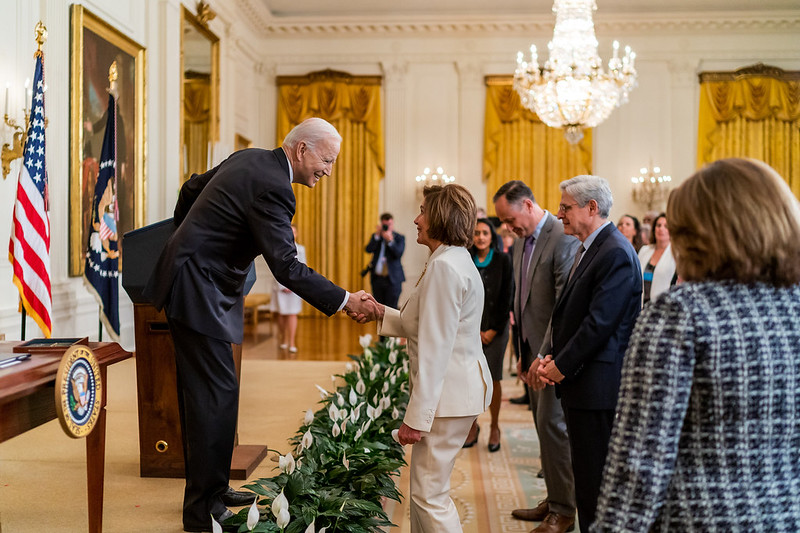A Strange Defense of the Biden Moratorium Extension Mess
A response to Neil Eggleston.

Published by The Lawfare Institute
in Cooperation With

The Biden administration’s handling of the Centers for Disease Control and Prevention (CDC) eviction moratorium extension was widely viewed to be lawless and a blow to the administration’s rule-of-law credibility. Commentators on the right had a field day with it. But it was not just the right that saw things this way. “If Donald Trump had done something like this, liberals would be justifiably worried that he was undermining the rule of law,” said my colleague Noah Feldman. “Mr. Biden does not get a pass on the rule of law because his heart is in the right place,” echoed the Washington Post editorial board. And further left one found cheers that the administration was acting lawlessly—which only enhanced the credibility of the lawlessness charge.
As I have explained previously, these uniform public impressions about the administration’s law-defiance are wrong. The administration did not in fact act lawlessly—it only appeared to do so because of bad messaging from White House press secretary Jen Psaki, White House coordinator for distribution of coronavirus relief funds Gene Sperling, and President Biden himself. In this light, I find former White House Counsel Neil Eggleston’s response to my piece puzzling.
Eggleston says that my take on the statements by Biden, Psaki and Sperling “was a law professor’s criticism, not a real-world criticism.” The appearance and reality of taking the rule of law seriously is not a classroom exercise; it matters to the successful implementation of policy. In any event, Eggleston is the one who is not considering the real-world implications of what happened. “I fail to see how [top administration officials’ statements] amount[] to the administration’s rule-of-law credibility being a big loser,” he says. Surely Eggleston knows that the dominant impression across the political spectrum was that the administration’s rule-of-law credibility tanked. The point of my essay was not to add to this perception. Rather, I argued that the perception was wrong; I defended the administration’s actions in renewing the moratorium as consistent with governing law (though possibly imprudent); and I speculated on how the administration could have blundered so badly in allowing the misimpression to form.
Rather than address how the misleading White House statements fed the public perception that the Biden team acted lawlessly, Eggleston defends the statements on the ground that they “were telling the public what they believed to be the practical effect of the court’s order rather than what law schools teach as a ‘holding.’” I agree that that is what these officials might have believed they were doing—and I said so in my original piece. And, as Eggleston suggests, they might have done so to make clear the urgency of congressional action, which, as I also noted, was the only bulletproof way to extend the moratorium.
The problem was that the administration did not think through how these statements would hurt it if Congress refused to act and then the administration changed course. Eggleston does not grapple with how the slippage between what the officials said (the Supreme Court declared the mortarium unlawful) and the truth (the Supreme Court did not declare the moratorium unlawful) came back to bite the administration hard when it flipped on a dime and implemented the new moratorium under political pressure from the left and (what appeared to be) advice from law professors.
Eggleston’s piece mischaracterizes my argument in many ways. I did not, as he says, “suggest that the White House counsel was deficient in failing to adequately brief the president and Psaki before each made their statements about the June 29 order.” I was careful not to cast blame for the public relations fiasco on anyone in particular, because we don’t know who is responsible. “If (as seems plausible) an administration lawyer advised Psaki and Sperling and President Biden that the Supreme Court had already ruled on the validity of the eviction moratorium, that lawyer made a mistake,” I said (emphasis added). “We don’t yet know about how the lawyers in the White House, the Justice Department, and the CDC coordinated their legal arguments and positions, but it did not work well,” I noted (emphasis added). “One wonders what system the Biden press secretary’s office has for coordinating its legal statements with White House lawyers on such consequential matters,” I mentioned, before speculating on the possibilities.
Eggleston says that “there is a suggestion in Goldsmith’s piece that the involvement of Laurence Tribe, Martha Minow, and Walter Dellinger was somehow improper or coerced by Pelosi.” I did not suggest anything of the kind. The New York Times reported that Pelosi did not accept the administration’s claims that its “hands were legally tied by a recent Supreme Court ruling” and urged the administration to “[g]et better lawyers.” The Times also reported that Pelosi “cited the opinion of Laurence Tribe,” which, “[a]s the political pressure mounted on Mr. Biden,” led White House Counsel Dana Remus to take “another look at options that had looked less attractive at the beginning of the month” and to consult law professors.
There is nothing inherently wrong with the White House consulting outside lawyers—even ones who are law professors! The president and his team can get legal advice from whomever they want. But it was a bad idea, I argued, to suggest publicly (as top officials did) that the administration had concluded that it had no legal options to renew the moratorium; then flip and issue a new moratorium under political pressure after (according to the Times) Pelosi said “get new lawyers”; and then suggest (as the president did) that the flip was supported by law professors. This combination of moves gave the unmistakable but very misleading impression that the president was shopping for the legal answer he wanted after his government lawyers told him “no.”
“An administration does not get to operate based solely on legal theories and must deal with reality, including changing political realities,” says Eggleston, defending the administration’s moves. True. And it dealt with them badly. As my earlier piece noted, there were good prudential arguments not to extend the moratorium even if it was a legally available option: The solicitor general’s credibility might be harmed since she represented to the court in June that “the CDC does not plan to extend the Order further”; and a loss in the Supreme Court on the merits of the renewed eviction moratorium “might limit the CDC’s ability to take vital emergency action in the future.”
On top of these costs that the administration now faces, many future policy and legal initiatives will be adversely affected—in court, within the administration and before the public—by the administration’s appearance of playing politics with its legal authorities here. It remains unclear who is responsible for this mess or exactly how it happened. But a big mess it is.





